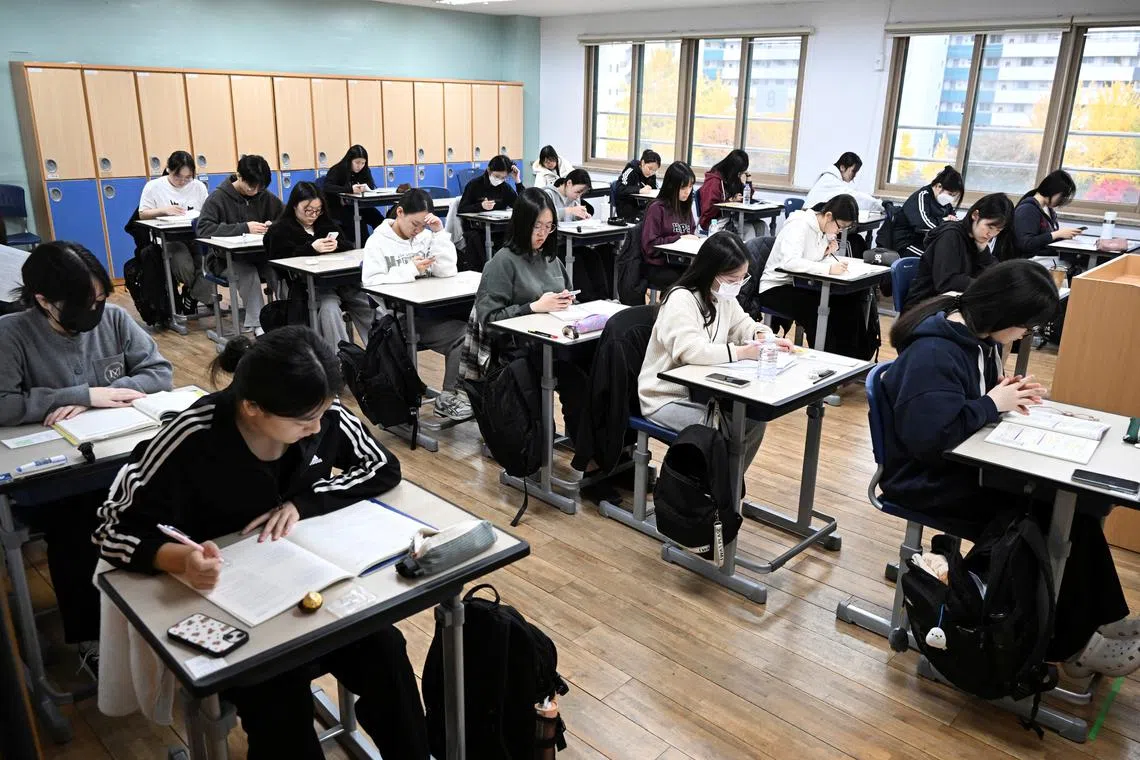South Korea scales back AI digital textbook rollout in classrooms
Sign up now: Get insights on Asia's fast-moving developments

Educators and parents have continuously voiced strong concerns over the scheme.
PHOTO: REUTERS
SEOUL - With just three months remaining before the new school year begins in March 2025, the South Korean government announced on Nov 29 it will unexpectedly scale back its plan to introduce digital textbooks powered by artificial intelligence (AI) in classrooms, adjusting the pace and deferring the roll-out for some subjects.
Under the scheme, the digital conversion of paper-based books for mathematics, English and informatics courses will go ahead as planned for third- and fourth-grade students, seventh-graders and first-year high school students.
The implementation of AI-powered digital textbooks for social studies and science will be pushed back for a year. These will be applied in classrooms in 2027, not 2026. Additionally, Korean language and technology and home economics textbooks will not be part of the conversion.
English and informatics and communications textbooks for students with disabilities will also not be converted. AI-powered digital textbooks for Korean language and mathematics will be developed in special education for elementary, middle and high school students.
The decision comes a year after the Education Ministry announced it would introduce AI-powered digital textbooks in June 2023 to reshape the way students learn, which still places heavy emphasis on memorising textbooks.
Educators and parents have continuously voiced strong concerns
Soon after the announcement on Nov 29, the professional association Korean Federation of Teachers’ Associations issued a statement calling for creating an environment that would make it easier for teachers to integrate and use digital textbooks.
Amid the growing concerns, the ministry underscored that AI-powered features would offer personalised learning experiences to students and help bridge achievement gaps in classrooms where students who get the most out-of-school tutoring at private academies excel.
The digital textbooks would also provide different learning materials, where academically advanced students can pursue more challenging studies, while those struggling get extra support from AI tutors, the ministry said.
Education Minister Lee Ju-ho shrugged off the concerns about the plan, saying that AI digital textbooks aim to enhance classroom participation and help students understand concepts more easily.
“Teachers can better understand their students’ learning abilities and encourage active learning by coming up with lessons that are more dynamic, such as through active discussions or classes that require teaming up with peers,” Dr Lee told reporters during press briefing on Nov 29.
“Unlike gadgets for entertainment purposes like social media, AI digital textbooks are used for educational purposes and aim to increase student participation in class. (The government) also plans to enhance education on digital citizenship so that students can use digital technologies responsibly and productively,” according to Dr Lee.
For example, AI textbooks will provide personalised feedback to students on their speaking and writing skills during English class, making classroom management easier and more efficient for teachers, Dr Lee answered when asked about the benefits of the AI scheme.
When it comes to maths, AI textbooks will allow students to understand mathematical theories and concepts they have difficulty with better, as well as provide extra problems for students to grasp the subject better instead of asking them to memorise maths formulas and repeatedly solve questions, according to Mr Lee.
“The Yoon Suk Yeol administration’s goal is to reduce the number of students who give up on mathematics and English through AI digital textbooks,” he said.
According to the minister, AI-powered education will make education “fairer” as students will have equal access to educational opportunities regardless of their backgrounds and abilities.
Meanwhile, 76 AI-powered digital textbooks designed for elementary to high school students have been certified for classroom use for the first time and will be displayed at schools starting Dec 2, according to the ministry. They were chosen from 146 digital textbooks submitted for certification by a qualification examination committee comprised of experts and incumbent teachers.
These will be available for use in classrooms starting the first semester of the 2025 academic year, and schools will go through a selection process to choose which one they will use. THE KOREA HERALD/ASIA NEWS NETWORK


